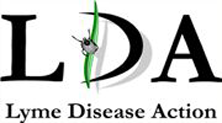PRESS RELEASE from LYME DISEASE ACTION
Registered charity 1100448.
February 2007
Contacts: Stephanie Woodcock on 01326 375419 and Katy Weston 0208 279 0378
Lyme Disease Action launch ‘Lobby for Lyme’ calling on the Government to take action to tackle
this serious and growing health problem
Lyme Disease Action is launching ‘Lobby for Lyme’ – a bid to raise awareness of this serious and potentially chronic health condition and calling on the government to make it a notifiable disease.(1)
Lyme disease is caused by
the bite of an infected tick; something that can happen on any country walk in the UK to any one of us. It can be difficult to diagnose and consequently many people with Lyme disease are not being recognised as having the disease.(2) This is leaving many people in a similar situation to Cecylia
Malenczak who has had the disease for 13 years. She was misdiagnosed and so was left for many years without treatment. Her condition has subsequently become chronic.
“You almost go into a deep despair sometimes and I honestly thought to myself that I can’t go on anymore. Some of the
symptoms are so horrendous you can’t explain it to people who haven’t suffered this illness. They don’t understand you. You look fine, they say. In fact, you feel dreadful. Your head is bursting. You can’t think straight. Your bones and muscles are aching; you’ve got pins and needles and numbness.
It’s just horrendous.”
Cecylia’s experience appears to be becoming an increasingly common one. Lyme Disease Action is aware of many cases where multiple, severe symptoms leave sufferers with very low quality of life and without any certain prospect of improvement or cure. It is always
worth trying treatment however, whatever stage a patient has reached.(3) The recent tragic death of Dr. Alasdair Crockett serves to highlight the desperation felt by sufferers.(4)
It doesn’t have to be like this. There is an effective antibiotic treatment available for those cases
identified in the early stages; the majority of these people return to good health.(5) However the consequences for those that are misdiagnosed can be devastating.
Lyme Disease is caused by the bite of an infected tick injecting into the bloodstream the bacterium ‘Borrelia’. The
incidence of the disease has been increasing in recent years.(6) Lyme Disease Action is calling for greater awareness of the disease among the medical profession. The government could take one step towards tackling this disease by making Lyme a notifiable disease.
Julia Goldsworthy MP for
Falmouth & Camborne is tabling an Early Day Motion (7) urging her fellow MPs to put pressure on the government.
“I first became aware of this serious health problem when I was contacted by constituents who had symptoms of Lyme disease, but who had been told they did not have this
disease.
“I learned that there are difficulties surrounding this diagnosis and it should be diagnosed on clinical symptoms. In the case of my constituents, treatment against Lyme disease was successful, enabling both to work and become active members of the community again. The
Department of Health really needs to look at this issue again.”
Note to Editors:
(1) A notifiable disease must be reported to public health authorities at the time it is diagnosed because it is potentially dangerous to human or animal health.
Notifiable diseases currently include Bird Flu, BSE and Anthrax.
(2) The current diagnostic procedure often includes an over-reliance on whether or not a person was at risk of a tick bite, whereas this risk is just one factor amongst many that should be considered. Added to this, the
current laboratory tests for Lyme disease are often inconclusive. The availability of doctors and consultants with expert knowledge of how to recognise and treat Lyme disease and associated tick-borne disease is currently inadequate. Lyme Disease Action has heard many accounts from patients of
being given incorrect information.
(3) Some cases of Lyme disease, especially those that are undiagnosed or untreated, may progress to develop the disease in a more chronic and severe form. Symptoms typically shown in chronic cases include: extreme tiredness, muscle pain, muscle weakness,
joint pain, upset digestive system, headache and involvement of the nervous system, including the brain.
(4) Details about the death of Dr Alasdair Crockett available here:
https://www.lymediseaseaction.org.uk/releases/lda_20.htm
(5) Cases of Lyme disease with a mild, uncomplicated primary infection, if treated in time, have a good prognosis. The majority of these people return to good health.
(6) Ticks and the diseases they carry are becoming increasingly widespread in the United Kingdom. Official figures for numbers of laboratory-confirmed cases of Lyme disease in England and Wales were 292 in 2003, 500 in 2004 and 595 in 2005. The Health Protection Agency (HPA) acknowledges
that these numbers do not equate to actual numbers of cases, which they estimate could be up to 2000 per annum. Lyme Disease Action has evidence that even these figures may be an underestimate.
(7) Full text of the Early Day Motion (EDM no. 874):
“That this House acknowledges that Lyme disease, also known as Lyme borreliosis, is a serious and potentially chronic disease which is becoming more widespread across the United
Kingdom; notes the growing body of evidence which suggests patients with this condition are frequently subject to misdiagnosis and under-treatment; is concerned the disease appears to be under-reported and inadequately investigated; calls upon the Government to make Lyme borreliosis
‘notifiable’ as a first step to tackling the disease.”
(8) Spokespeople are available, please contact Stephanie Woodcock on 01326 375419 or Katy Weston on 0208 279 0378.
LDA Press office: press@nulllymediseaseaction.org.uk
(9) Lyme Disease Action – Striving for prevention and treatment of Lyme Disease and associated tick-borne diseases. https://www.lymediseaseaction.org.uk
(10) Lyme Disease Action is a registered charity No.
1100448.

 Printer Friendly
Printer Friendly